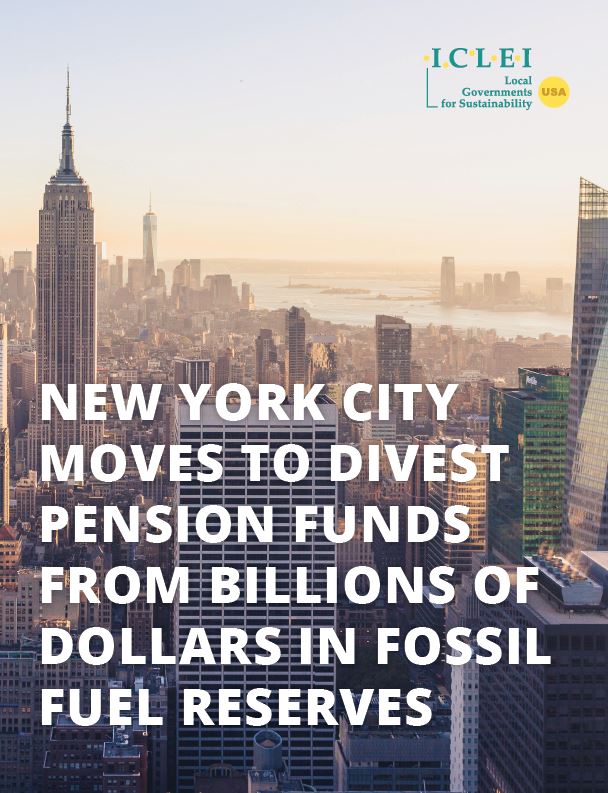ICLEI USA and the New York City Mayor’s Office released a this case study at Global Climate Action Summit 2018, detailing why and how NYC has begun to divest billions of pension fund dollars from fossil fuels. This case study is the first in-depth look at this decision since Mayor Bill de Blasio made the announcement in January. It aims to show peer cities, large and small, that the principles and processes behind fossil fuel divestment are transferable to nearly any location where the will to divest exists.
“New York City Moves to Divest from Billions of Dollars in Fossil Fuel Reserves” shows that the principles and processes behind fossil fuel divestment are transferable to nearly any city, large or small, where the will to divest exists.
New York City’s fossil fuel divestment announcement follows more than a decade of aggressive climate action. Guiding the city’s climate and sustainability program is One New York: The Plan for a Strong and Just City (OneNYC). OneNYC addresses climate mitigation alongside economic development, diversity and inclusion — and sustainability more broadly — to form an overarching resilience strategy that calls for an 80 percent reduction in greenhouse gas emissions by 2050, compared to 2005 levels. The city is on its way to achieving this goal, having already reduced emissions 15 percent below baseline. The path to achieve these deep emissions reductions is outlined in NYC’s 1.5°C climate action plan, which aims to bring the city’s actions in line with the Paris Agreement’s 1.5-degree Celsius target.
Key actors speak in support of NYC’s divestment decision
“Cities are on the front lines of climate change, which is why mayors and other local leaders must embrace bold solutions that protect our residents and pension holders alike,” said Mayor de Blasio. “New York City is proud to take a stand against fossil fuel companies by leading the charge with our divestment strategy. At the same time, we are sharing our knowledge and expertise with cities around the world through our new partnership with London and C40 Cities.”
“As one of ICLEI’s longest standing members, New York City sets a strong example for our global network of more than 1,500 local and regional governments worldwide. The city’s divestment action is another demonstration of its ambitious climate track record and is bringing the city one critical step closer to climate neutrality. At ICLEI, we call on our network to divest and end the fossil fuel era, building a climate neutral world before mid-century,” said Gino Van Begin, Secretary General, ICLEI – Local Governments for Sustainability.
“New York City’s decision shows that divestment isn’t scary — it’s practical,” said Bill McKibben, Co-founder and Senior Adviser at 350.org. “Since the beginning of the divestment movement, 350.org has said that it doesn’t make sense for cities to be spending billions of dollars preparing for the impacts of climate change while investing billions more in fossil fuels. That the financial centers of the world are now taking this step is particularly important, because the people who understand how money tends to flow are standing behind the decision to divest.”
“New York City manages some of the biggest and most complicated pension funds in the world. If divestment can work here, it can work anywhere,” said Daniel Zarrilli, NYC’s Chief Climate Policy Advisor and OneNYC Director. “This case study by our partners at ICLEI demonstrates that Mayor de Blasio’s strong leadership combined with sustained engagement by grassroots activists were critical components in New York City’s fossil fuel divestment. We’re committed to helping other cities that want to leverage their investments to fund the fight against climate change and accelerate the transition to a carbon-free economy.”
“New York City is a leader in the divestment movement,” said Angie Fyfe, Director of ICLEI USA. “ICLEI is a strong proponent of shedding the legacy of fossil fuels. Every city has a role to play. We look forward to helping our network cities to take the lessons of New York City and be inspired to apply them in their local context.”



